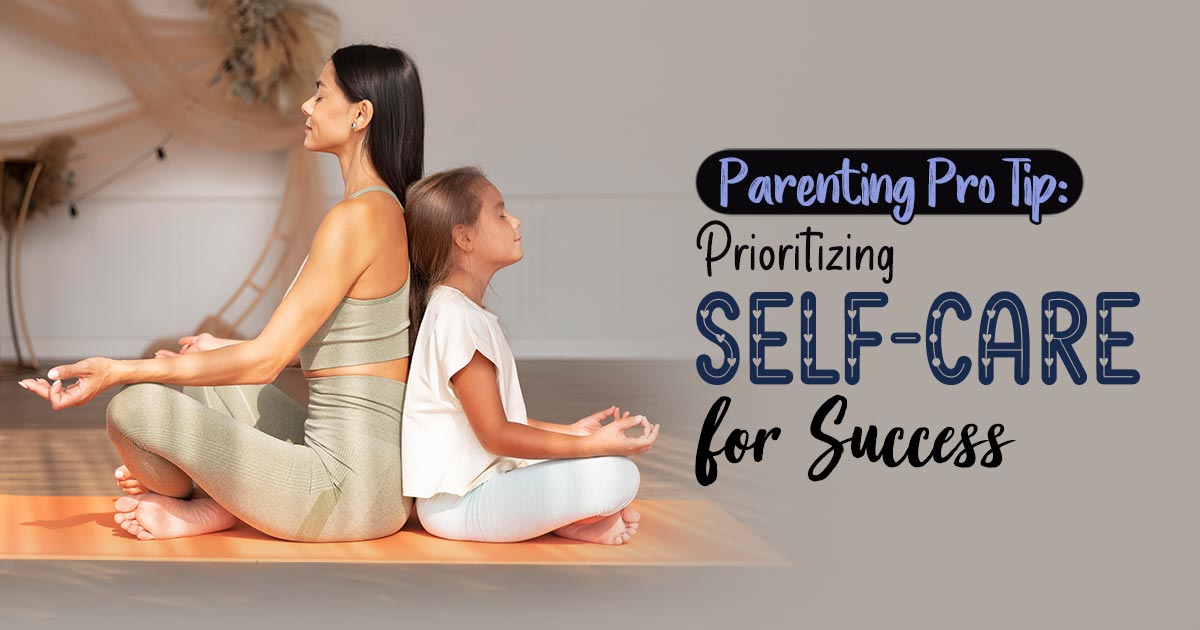Parenting is a multifaceted role, often described as both rewarding and challenging. In the midst of these responsibilities, parents frequently overlook their own well-being, which can inadvertently compromise their ability to provide the best care for their children. Self-care in parenting plays a pivotal role in addressing this issue.
Understanding Self-Care In Parenting
Self-care in parenting is a conscious and regular practice that involves attending to one’s physical, emotional, and mental needs while navigating the responsibilities of parenting. It is not a selfish act but a critical strategy that empowers parents to better care for their children.
Physical self-care encompasses activities that support parents in maintaining their physical health, including regular exercise, a balanced diet, adequate sleep, and routine medical check-ups, enabling them to meet the physical demands of parenting and sustain their vitality.
Emotional self-care is centered on recognizing and addressing emotional needs through seeking support, enhancing emotional intelligence, and adopting healthy coping strategies, fostering effective emotion management and serving as a role model for their children.
Mental self-care revolves around nurturing cognitive well-being by engaging in hobbies, reading, or pursuing personal aspirations, offering intellectual stimulation that extends beyond the parental role, contributing to overall contentment. Social self-care revolves around maintaining healthy relationships outside of the family, providing emotional support, and serving as an example to children in developing relationship-building skills.
The Advantages Of Self-Care In Parenting
Self-care in parenting offers numerous benefits for both parents and their children. Here are some of the most significant advantages:
1. Enhanced Parental Well-Being
Self-care helps parents reduce stress and burnout, leading to improved mental health. When parents are emotionally and physically well, they can provide a more stable and nurturing environment for their children, resulting in a happier family unit.
2. Improved Parent-Child Relationships
Parents who engage in self-care are more patient, understanding, and emotionally available to their children. Effective communication and empathy are nurtured, fostering healthier parent-child relationships.
3. Role Modeling
Parents who practice self-care teach their children the importance of prioritizing their own well-being. This encourages children to develop their self-care habits as they grow, equipping them with vital life skills.
4. Stress Reduction
Self-care equips parents with effective stress management tools, such as meditation, yoga, or mindfulness practices. This enables them to stay calm in the face of parenting challenges and maintain their mental equilibrium.
5. Increased Resilience
Self-care builds emotional resilience in parents, making them better equipped to handle adversity and adapt to changing circumstances. This quality is essential in teaching children how to navigate life’s challenges.
The challenges of self-care in parenting are multifaceted, as several factors can impede parents from prioritizing their well-being. Time constraints stemming from the demands of parenting, work, and household responsibilities can limit opportunities for self-care, necessitating effective time management and prioritization. Feelings of guilt when taking time for self-care are common, as parents worry about neglecting their children, acting as a significant barrier.
Additionally, a lack of support, whether due to the absence of a partner or extended family, limited access to childcare, or financial constraints, can hinder self-care practices. Societal expectations, which often place an unrealistic burden on parents to be entirely selfless and sacrifice their own well-being for their children’s sake, can make it challenging for parents to justify prioritizing self-care.
Strategies For Successful Self-care In Parenting
Overcoming the challenges of self-care in parenting requires careful planning and a commitment to one’s well-being. Here are some strategies to help parents incorporate self-care into their daily lives:
1. Prioritization
Parents must recognize that self-care is not a luxury but a necessity. By making self-care a priority, they can create time for activities that promote their well-being.
2. Setting Boundaries
Establishing clear boundaries for work, parenting, and self-care is crucial. Parents should communicate these boundaries with their family and ensure they are respected.
3. Seeking Support
It is essential for parents to seek support from friends, family, or support groups when possible. This can provide the necessary assistance to create space for self-care.
4. Time Management
Efficient time management is vital for parents. Scheduling self-care activities into their daily routines, even in small increments, can make a significant difference.
5. Self-Compassion
Parents should practice self-compassion and release the guilt associated with self-care. By acknowledging that they deserve care and attention too, they can free themselves from unwarranted guilt.
Self-care in parenting is not a luxury; it is a fundamental requirement for raising happy, healthy, and well-adjusted children. By addressing their physical, emotional, and mental needs, parents can provide a more stable and nurturing environment for their children. The benefits of self-care in parenting are numerous, including improved parental well-being, stronger parent-child relationships, and the modeling of crucial life skills.
Although there are challenges, such as time constraints, guilt, and societal expectations, parents can overcome these obstacles with careful planning and prioritization. By embracing self-care as an integral part of their parenting journey, they can ensure that they are better equipped to face the challenges of raising children, setting a positive example for the next generation. In the end, self-care is not just for the parents’ sake; it is for the well-being of the entire family.




























